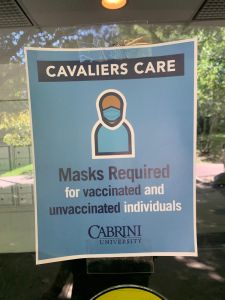I’m sure we all got used to not wearing a mask this summer as we got a taste of what “normalcy” felt like again. However, it’s now time to put them back on.
On Aug. 5, Stephen Rupprecht, Dean of Students and Chair of the COVID-19 Task Force, communicated to the Cabrini community via email about the university’s updated mask mandate.
Due to the highly infectious Delta variant of the coronavirus and the high transmission rate in our area, Cabrini made the choice to require facemasks indoors for all students, faculty and staff, regardless of their vaccination status.

Masks are to be worn covering the mouth and nose in all public and shared indoor spaces on campus. Masks are not required outdoors or in your private residence or office. However, masks are required and are assumed to be worn for those unvaccinated in other private residence halls.
This update comes from new guidance from the CDC, stating that vaccinated individuals can still become infected with the new variant and spread it to others. It is also a requirement that remains consistent with other higher education institutions that share the same goal of keeping college campuses safe.
When asked about more specifics of the mask mandate, Rupprecht said that anything other than a private residence hall and office is considered a shared space. For example, if a student were to go into Founder’s hall after hours to utilize a classroom by themselves, they should still and are assumed to be wearing a mask. He explained that if you are alone in a room, someone may come into that space immediately after you have vacated it, when transmission is still possible.
Masks are not required outside, regardless of vaccination status. If outside alone or in a group, it was recommended by Rupprecht that everyone gauge their own comfort level with mask-wearing when outside.
“I am not aware of any backlash from students or employees about having to wear masks. I think most people have caught on by now that mask-wearing can reduce the spread of COVID-19, and no one wants to get this virus, let alone spread it,” Rupprecht said.
Wearing a mask and having a strong rate of vaccination on campus this fall is highly important to remain primarily in-person on campus this year. The biggest consequence of not following mitigation measures is the possibility of spreading COVID-19, which is “far worse than any student conduct response,” Rupprecht said. He also said that for any students who are referred to his office for misconduct, situations like these are addressed with an educational and corrective approach first.

This updated mandate took effect on Aug. 9 and does not have an expected end date.
Cabrini will continue to monitor the most up-to-date guidance on coronavirus mitigation measures as well as transmission rates in our area to best protect the campus. “We will take this one day at a time, one week at a time, and one month at a time,” Rupprecht said.


